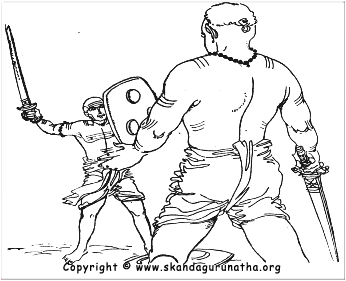By Swami Sivananda
Enathi Nayanar was a Shanar (toddy tapper). He was born in Eyinanur in Chola Kingdom. It was situated to the south-east of Kumbakonam on the bank of the river Arisol. It was a very fertile and rich kingdom.
Enathi was an ardent devotee of Lord Siva, like Meypporul Nayanar, however, Enathi was devoted even to the external marks of Siva bakthi. To Enathi, the three white lines of vibhuthi (sacred ash) on one's forehead were sufficient to evoke his own reverence.
It would not be out of place here to say a word about this mark on the forehead of devotees of Siva. Through this mark Lord Siva teaches silently that the spiritual aspirant should destroy the following:
-the three types of impurities, viz. ,Anavam (I-ness), Karma (selfish activity), and Maya (illusion);
-the three desires or Eshanas, viz., desire for worldly goods, for son and for wife
-the three Vasanas or subtle tendencies, viz., Lokavasana (worldliness), Dehavasana (attachment to the body) and Shastravasana (blind faith in the scriptures and polemics),
-and that he should transcend the three bodies (physical, astral and causal), and the three states, viz., waking, dreaming and deep sleep,—and eventually attain union with Lord.
The Shastras assure us that vibhuthi is a divine healer. It cures all diseases, including the disease of birth and death, and bestows on the devotee who wears it, the highest wealth, viz., Moksha.
Such is the glory of the sacred ash! No wonder Enathi worshipped whoever came to him with the ash on their forehead. Enathi saw Lord Siva in them. He was ready to give even his own life at the feet of such a devotee who wore the sacred holy ash.
Enathi Nayanar was a very good swordsman. He was a tutor to the princes in fencing. He earned a good income from his profession. He spent all his income in the service of Siva bhaktas. He became very popular, too. This evoked the jealousy of another man belonging to the same profession, by name Atisuran. Contrary to his name (which means a great hero), he was not at all skillful and not strong either, because he was full of vices. Yet, he wanted to fight with Enathi and defeat him.
One day Atisuran marched towards Enathi's house, with all his relatives, fully armed — he hoped to defeat Enathi , with the help of his relatives. He stood in front of Enathi's house and challenged him to a fight— jackal coming to fight the lion. Enathi accepted the challenge and came forward to fight. Atisuran got frightened. He asked Enathi to come to the nearby grove to fight with him. The relatives of Atisuran were waiting in the grove. In the mean time, the friends of Enathi had also gathered around him. The two parties fell on each other, and in the terrible fight that ensued many lives were lost. Atisuran escaped with his life and ran away from the grove. However, Atisuran still wanted to kill Enathi, not in open fight (which was impossible), but by stratagem.
The next day, Atisuran sent a message to Enathi saying, "Let us fight again, but without any assistance this time — otherwise, many innocent people die on our account. Let us go to a lonely place, without anyone's knowledge and fight."
Enathi accepted the challenge.
The next morning, Enathi went away secretly and was awaiting Atisuran's arrival at the stipulated place. Atisuran, with the sacred ashes on his forehead (which was cleverly hidden by his shield) approached Enathi.
Enathi pounced upon him, with a big roar. In a moment, Atisuran removed the shield, revealing the sacred ashes. Enathi quickly lowered his sword and thought, "What a sin I was about to commit! He has become a Siva bhakta now. I must not harm him. Let him achieve his object of killing me."

Enathi wanted to throw the sword away, but kept it in his hand, else Enathi would be compelling his opponent (a Siva bhakta!) to incur the sin of killing an unarmed person. As Enathi was mutely standing, thus, Atisuran killed him.
Lord Siva was highly pleased with this self-sacrificing devotion that Enathi had for the sacred ash. The Lord appeared before Enathi as he fell, and took him to His Abode.
References:
![]() Sekkilaar, and G. Vanmikanathan. Periya Puranam — A Tamil Classic On The Great Saiva Saints of South India. Ed. Dr. N. Mahalingam. Chennai: Sri Ramakrishna Math, 2000.
Sekkilaar, and G. Vanmikanathan. Periya Puranam — A Tamil Classic On The Great Saiva Saints of South India. Ed. Dr. N. Mahalingam. Chennai: Sri Ramakrishna Math, 2000.
![]() Sivananda, Swami. Sixty-Three Nayanar Saints. World Wide Web edition. India: Divine Life Society, 1999.
Sivananda, Swami. Sixty-Three Nayanar Saints. World Wide Web edition. India: Divine Life Society, 1999.
See Also: